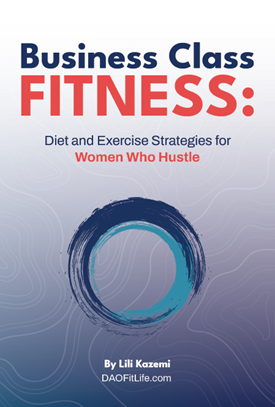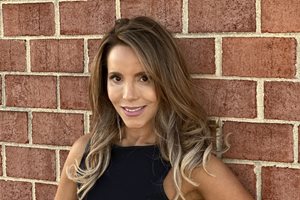Author Chats
In New Book, Lili Kazemi Lays Out Fitness Strategies for Busy Professionals
July 11, 2023
Although Lili Kazemi, a director at a Big Four accounting firm, has extensive experience with tax law and policy, she is increasingly being asked to speak about wellness issues for professionals.
This spring Kazemi published Business Class Fitness: Diet and Exercise Strategies for Women Who Hustle, focusing on the particular challenges facing professional women. In the book she proposes solutions for mental and physical health that accommodate busy schedules and complex obligations, though she is quick to note that the tactics apply regardless of gender.
Here she discusses her fitness philosophy to help others find a sustainable approach to wellness, tackling everything from fad diets to eating on the go.
How did your book come about?
I’ve always had a dream of someday publishing a book, and they always say to write what you know. So, it seemed like a good fit and was so easy to just write and write about. I started my manuscript in 2018. By 2020 I had written over 40,000 words.
In 2021 I launched my website and formulated the concept of DAO to organize the content and start engaging with the target audience. DAO is an acronym for the concepts: decide, act, and outlook. In the corporate sector, everybody loves acronyms and blueprints, and DAO has been the branding vehicle around which I organized the content.
Building the blog and engaging with the audience helped work as a catalyst for me to finish the book, which I completed in April 2023.
How did your experiences and philosophy shape the book-writing process?
The biggest thing I’ve learned is that a process that is creative and takes time is the only one that will work. Every time I’ve chased a quick fix, or a fast solution — and I have — it has failed. That’s also what I write about.
I have chapters about fitness fads and popular diets. I have definitely gone down those paths, and I’ve realized that sustainability prevails overall. This is especially true when you have to maintain a serious career.
I try to write from the point of view of a businessperson. You wouldn’t run a big engagement project without knowing what your budget is, or without tracking some sort of metrics. This is how you would approach something at your job. If you apply some of the logic and framework used at a job managing big projects, it really does translate and provide some practical results. You are the CEO of your well-being. [For] people in professional services jobs that are mostly sedentary, how can they approach fitness? How do they want to have it presented? It is like a paper I would write for my job, but on the topic of wellness. I include comprehensive appendices and QR links to digital versions of articles. The accessibility of information is important. The harder you make [it to access] information, the less likely people are to pursue it. I’m trying to make the information easy to access.
Your book links to your online content extensively. Tell us about this choice.
I wanted to make the information accessible. The book itself could be pretty intimidating, but the intention is for it to function as a kind of reference or guide. It isn’t a continuous thing that you need to read cover to cover to find value.
I’ve read a lot of fitness books, probably more than most. I like physical books, holding them and referring to them. Magazines, too. When I’m traveling, I’ll go to the airport bookstore and buy all the fitness magazines and read them on the plane.
What I wanted to avoid is what I see in many books, in which they tell you that they have the solution to your fitness problems, but then you have to read and read and read until they finally get to the point at the end of the book. I tried to do the opposite. I start out by providing the point, and then I have a structure to apply that point to the many different situations that a person may find themselves in. The book’s organization allows you to jump into information about exercise, diet, or other specific issues that are part of the overall approach to wellness.
Adaptability and flexibility are important. One example involves my “little black dress” meal-planning method. I had been structuring an approach to meal planning. You have your basic macros, protein, fat, and carbs. The goal is not to meticulously plan meals every single beginning of the week for five hours and then be bound to that. The goal is to have a flexible meal system that still eliminates decision fatigue and gives you more power over your time and your choices.
The “little black dress” concept came to me because if I need to dress in a hurry, I — and maybe other women — have that one thing in my closet I know can fit that will work and get me out the door. The male version might be like Steve Jobs’s black turtleneck. The idea is for a meal to be constructed out of building blocks.
How do you balance your career as a lawyer and your passion for wellness?
I think it was Winston Churchill who said that the best thing you can do is t o have a hobby. A hobby can enhance your leadership qualities and thinking skills. Everyone should have something that they engage in outside of their day-to-day job, using a different part of their brain. It feels like the synapses connect in new ways.
o have a hobby. A hobby can enhance your leadership qualities and thinking skills. Everyone should have something that they engage in outside of their day-to-day job, using a different part of their brain. It feels like the synapses connect in new ways.
Ultimately, it all has to do with information. My day job involves a lot of information management. I think that this project has made me better at that part of my work. When you approach information that you aren’t engrossed with technically … you find the ability to be neutral and distill concepts creatively.
Professionals can leverage their career success to drive their efforts to achieve health and wellness. They can look back on their own lives and how much they’ve achieved, how they put in all the hard work and … gotten through all their struggles. That can provide them with the fuel they need to overcome the challenges they face ahead in career and in life.
The obstacles are surmountable. You have this great brain, this great problem-solving capacity, the ability to juggle competing values and interests. I hope that I have provided a blueprint to make things a little less daunting and more approachable, and to fit the art of fitness into their lives, and not the other way around. Wellness doesn’t involve upending your life or upending your career.
Frankly, we’re all a bunch of high achievers. I can do it. You can do it. It is all about finding your purpose and reaffirming it through your actions.
Where can readers find out more about you, your book, and your approach to fitness?
In a lot of places! But start with the landing page on my website, daofitlife.com. My book is available on Amazon; connect with me on LinkedIn and YouTube.


